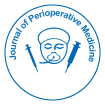
Journal of Perioperative Medicine
Open Access
ISSN: 2684-1290
+44 1478 350008

ISSN: 2684-1290
+44 1478 350008
Opinion Article - (2023)Volume 6, Issue 3
Perioperative medicine, a rapidly evolving field of medicine, focuses on optimizing patient care before, during, and after surgical procedures. By improving patient outcomes and reducing the likelihood of postoperative complications, perioperative medicine can play a critical role in reducing healthcare costs.
Reducing postoperative complications
One of the primary ways in which perioperative medicine can reduce healthcare costs is by reducing the likelihood of postoperative complications. Complications such as wound infections, pneumonia, and blood clots can increase hospital stays, require additional treatments, and ultimately lead to increased healthcare costs.
Preoperative assessment, which involves a comprehensive evaluation of a patient's medical history and current medications, can help identify patient-specific risk factors and develop personalized care plans. By addressing these risks before surgery, healthcare providers can take steps to reduce the likelihood of postoperative complications and prevent unnecessary healthcare costs.
Improving patient outcomes
Perioperative medicine can also improve patient outcomes, which can lead to lower healthcare costs. By optimizing patient care before, during, and after surgical procedures, healthcare providers can help patients recover more quickly and avoid complications that could lead to additional healthcare costs. For example, patients who receive appropriate preoperative counseling and education may be better prepared for their surgery and have a better understanding of what to expect during and after the procedure. This can lead to a faster recovery and a reduced likelihood of complications, ultimately resulting in lower healthcare costs.
Reducing hospital stays
Perioperative medicine can also help reduce hospital stays, which can significantly reduce healthcare costs. By identifying patientspecific risk factors before surgery and developing personalized care plans, healthcare providers can take steps to reduce the likelihood of complications and improve patient outcomes, which can lead to shorter hospital stays.
In addition, perioperative medicine may involve the use of Enhanced Recovery After Surgery (ERAS) protocols, which focus on optimizing the patient's recovery after surgery. These protocols may include early mobilization, pain management, and nutritional support, which can help patients recover more quickly and reduce the need for extended hospital stays.
Lowering readmission rates
Perioperative medicine can also help lower readmission rates, which can significantly reduce healthcare costs. Patients who are readmitted to the hospital after surgery may require additional treatments and procedures, which can result in higher healthcare costs.
By optimizing patient care before, during, and after surgery, healthcare providers can help reduce the likelihood of complications and improve patient outcomes, which can lead to lower readmission rates. In addition, postoperative care plans may include follow-up appointments, medication management, and physical therapy, which can help patients recover more quickly and avoid readmission to the hospital.
Perioperative medicine is a key factor in reducing healthcare costs. By reducing the likelihood of postoperative complications, improving patient outcomes, reducing hospital stays, and lowering readmission rates, perioperative medicine can significantly reduce healthcare costs and improve patient care.
As healthcare costs continue to rise, the importance of perioperative medicine cannot be overstated. By optimizing patient care before, during, and after surgical procedures, healthcare providers can help patients recover more quickly and avoid complications that could lead to additional healthcare costs. Ultimately, perioperative medicine is not just a way to improve patient outcomes; it is also a critical factor in reducing healthcare costs and ensuring access to high-quality care for all patients.
Citation: Feng C (2023) Perioperative Medicine: A Key Factor in Reducing Healthcare Costs. J Perioper Med. 6:169.
Received: 02-May-2023, Manuscript No. JPME-23-24134; Editor assigned: 04-May-2023, Pre QC No. JPME-23-24134 (PQ); Reviewed: 18-May-2023, QC No. JPME-23-24134; Revised: 25-May-2023, Manuscript No. JPME-23-24134 (R); Published: 01-Jun-2023 , DOI: 10.35248/2684-1290.23.6.169
Copyright: © 2023 Feng C. This is an open-access article distributed under the terms of the Creative Commons Attribution License, which permits unrestricted use, distribution, and reproduction in any medium, provided the original author and source are credited.